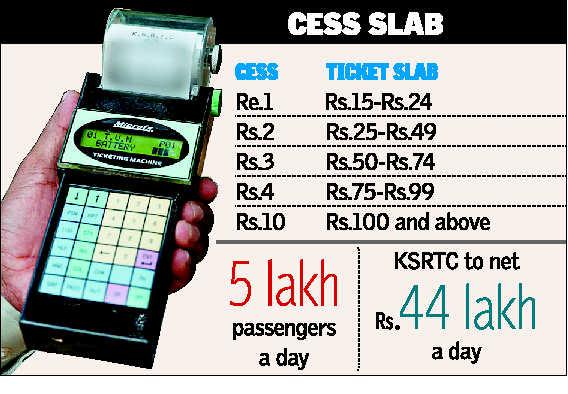Cash crunch, drop in daily collections, mounting loan repayment, and curtailment of schedules are threatening to further batter the Kerala State Road Transport Corporation (KSRTC).
The average daily ticket collection has dropped to Rs.4.89 crore in March from Rs.5.17 crore in February and Rs.5.42 crore in January. Revenue from ticket collection is not strong even this month; the daily ticket collection on Thursday was Rs.4.74 lakh.
The average daily operated kms have come down from 16.14 lakh in February to 15.73 lakh in March.
This confirms the curtailment of schedules as the KSRTC fleet has gone up from 5,925 in January to 5,973 in March.
The curtailment is mostly in the north.
In Palakkad alone, 30 to 35 schedules are being cancelled daily.
Officials say this benefits the private stage carriers, which are offering up to 20 per cent discount on fares in the wake of fall in the price of diesel.
The cess being levied on passenger tickets above Rs.14 in the KSRTC from April too has failed to fetch the expected revenue.
The revenue from cess hovers around Rs.11.70 lakh to Rs.21 lakh.
The inability to collect cess through the old electronic ticketing machine (etm) and the people’s preference for private stage carriers are the reasons cited.
Conductors who use the old etm have to carry the rack now to issue paper tickets and this has come in for opposition.
The corporation had purchased 4,000 new etms, but nearly half of them are not working, officials said.
The faulty ones have not been replaced.
The average earnings per km and the earning per bus have also come down. The daily collection from the three units in Palakkad is going to the Palakkad District Cooperative Bank as repayment for the Rs.100-crore loan taken by the corporation.
This has aggravated the cash crunch.
The corporation needs Rs.2.60 crore to repay loan and Rs.2.28 crore for the fuel bill.
The advantage of 15 days’ credit given by IOC was used to pay pension. The pension for December last and March is due.
Nearly 200 chassis are lying in five workshops for body building.
Lack of financial management and monitoring of operations have contributed to the crisis.
News: The Hindu



















